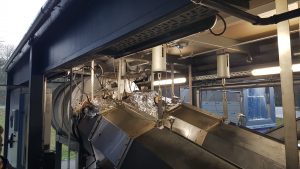
On 18 – 19 February 2019, the EGAR RG, together with colleagues from Mendel University of Agriculture and Forestry in Brno and ZERA Agency (Agricultural and Environmental Regional Agency, zs.) participated in an excursion to the WWTP Linz – Unkel near Bonn, Germany.
At this wastewater treatment plant, a unique PYREG facility is operated, which provides pyrolysis treatment of sewage sludge. The project, funded by the German government and taking into account the amended German Sewage Sludge Decree, is interesting from two perspectives. It uses phosphorus, resp. the PYREG plant drains the sewage sludge, carbonizes it, disinfects it and can be used as a soil conditioner or fertilizer with high bioavailable phosphorus content. Furthermore, it is a device that is autothermal – pure energy from the treated sewage sludge is used for plant operation.
The EGAR research group, together with its partners, is engaged in microwave torrefaction of sewage sludge, which is one of the forms of low temperature pyrolysis. In the AdMaS center, within the scope of the research, dried sewage sludges from various large WWTPs on laboratory equipment are tested, as well as in a small pilot plant with a capacity of about 10 kg of dry sewage sludge per experiment. The RG EGAR also shares similar goals with the German colleagues – to transform the sewage sludge with the technology into a carbonaceous product with a wide application – in agriculture, energy, or as a filter medium.
The aim of the excursion was to exchange contacts and experience from the operational application of technology, the possibility of comparing legislation, when the Czech Republic is currently deciding how to deal with future treatment of sewage sludge, and the so-called German route is one of the options. At the same time, RG EGAR received samples of carbonaceous product, which can be further compared with its own development.


